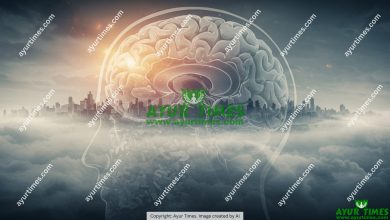Ayurvedic Treatment for Parkinson’s Disease

Parkinson’s Disease (PD) is a progressive neurodegenerative disorder characterised by bradykinesia (slowness of movement), resting tremors, rigidity, and postural instability. It results from the gradual loss of dopaminergic neurons in the substantia nigra region of the brain.
In Ayurveda, Parkinson’s Disease closely resembles Kampavata, a condition mentioned under Vata Vyadhi (neurological and neuromuscular disorders). It primarily involves an aggravation of Vata Dosha, especially when combined with depletion of Majja Dhatu (bone marrow/nervous tissue) and Ojas (vital immunity essence).
Ayurvedic Dosha Analysis & Treatment Principle
- Primary Dosha Involved: Vata (especially Prana Vata & Vyana Vata)
- Secondary Involvement: Kapha (due to obstruction and rigidity), sometimes Pitta (if associated with inflammation or oxidative stress)
- Affected Dhatu: Majja (nervous tissue), Mamsa (muscle), and Ojas
- Srotas Involved: Majjavaha, Mamsavaha, and Pranavaha Srotas
Treatment Principle:
- Vata Shamana – pacifying aggravated Vata through nourishing (Brimhana), oleation (Snehana), and stabilising therapies.
- Majja Dhatu Rasayana – rejuvenation of the nervous system.
- Srotoshodhana – cleansing obstructed channels, particularly in the nervous system.
- Rasayana – improving vitality and resistance to progression.
- Medhya Chikitsa – nootropic and neuroprotective support.
Ayurvedic Treatment Protocol
| Stage | Therapy | Purpose |
|---|---|---|
| Initial | Snehapana with Medicated Ghee (e.g. Brahmi Ghrita) | Oleation for Vata pacification |
| Purificatory | Basti (Medicated Enema) – Niruha & Anuvasana | Elimination of morbid Vata from colon |
| External | Abhyanga (Oil Massage) + Shirodhara | Nourishment and calming of nerves |
| Rejuvenation | Medhya Rasayana, Majja Rasayana | Nervine regeneration and mental support |
| Ongoing | Diet and lifestyle correction, Herbal medicines | Maintenance and slowing degeneration |
Treating Root Cause
According to Ayurveda, the root causes of Kampavata (Parkinson’s) are:
- Dhatukshaya (Tissue depletion) – especially Majja and Ojas
- Vata Prakopa (Vata imbalance) – due to age, stress, improper diet, or overexertion
- Avarana (Obstruction of Vata by Kapha or other Doshas) – leading to tremors and stiffness
Thus, treatment focuses on removing the obstruction (Avarana), strengthening the nervous system (Majja), and balancing Vata through internal and external therapies.
Ayurvedic Treatment & Medicines
Ayurvedic Medicines for Parkinson’s Disease
| Medicine | Key Action |
|---|---|
| Ashwagandha | Rasayana, Vata balancing, neuroprotective |
| Brahmi Ghrita | Medhya Rasayana, improves cognition and tremors |
| Mucuna Pruriens (Kapikacchu) | Natural source of L-Dopa, dopamine precursor |
| Saraswatarishta | Nootropic, antianxiety, supports speech and memory |
| Yograj Guggulu | Vata-Kapha pacifying, anti-inflammatory, improves joint flexibility |
| Vatachintamani Ras | Classical mineral formulation for Vata Vyadhi |
| Mahakalyanaka Ghrita | Brain tonic, Rasayana for Majja and Ojas |
| Dashamoola Kwatha | Relieves rigidity, supports Vata regulation |
| Shankhpushpi | Enhances memory, reduces mental fatigue |
Explanation of Medicines
1. Ashwagandha
- How it Works: Strengthens muscles, improves resilience, and pacifies Vata. Acts as a nervine tonic and adaptogen.
- Suitable Dosha: Vata and Kapha
- Recommended Symptoms: Tremors, muscle stiffness, fatigue, anxiety
- Avoid In: Very high Pitta, bleeding tendencies, severe gastritis
2. Brahmi Ghrita
- How it Works: Medicated ghee infused with Brahmi and other Medhya herbs; improves neurocognitive function and strengthens Majja Dhatu.
- Suitable Dosha: Vata-Pitta
- Recommended Symptoms: Cognitive decline, insomnia, tremors, emotional instability
- Avoid In: Kapha excess, very sluggish digestion
3. Kapikacchu (Mucuna Pruriens)
- How it Works: Provides natural L-Dopa, which compensates for dopamine deficiency in Parkinson’s.
- Suitable Dosha: Vata
- Recommended Symptoms: Bradykinesia, tremors, stiffness
- Avoid In: Active Pitta disorders, severe hyperacidity
4. Saraswatarishta
- How it Works: Classical fermented tonic that supports memory, speech, and motor control through nervine and Medhya herbs.
- Suitable Dosha: Vata-Pitta
- Recommended Symptoms: Speech difficulty, mental dullness, anxiety
- Avoid In: Alcohol intolerance, Pitta aggravation
5. Yograj Guggulu
- How it Works: Combines deep tissue detoxification with Vata-Kapha pacification, reduces inflammation, and improves joint and muscular movement.
- Suitable Dosha: Vata-Kapha
- Recommended Symptoms: Rigidity, muscle cramps, sluggishness
- Avoid In: High Pitta or sensitive gut
6. Vatachintamani Ras
- How it Works: Herbo-mineral formulation effective in managing Vata disorders, especially neurodegeneration.
- Suitable Dosha: Pure Vata disorders
- Recommended Symptoms: Severe tremors, nervous debility, loss of coordination
- Avoid In: Pitta aggravation, in children or unmonitored long-term use
7. Mahakalyanaka Ghrita
- How it Works: Majja and Ojas Rasayana; nourishes the brain and promotes rejuvenation.
- Suitable Dosha: Vata-Pitta
- Recommended Symptoms: Mental dullness, low Ojas, nervous breakdown
- Avoid In: Heavy Kapha conditions, slow metabolism
8. Dashamoola Kwatha
- How it Works: Anti-inflammatory, relieves Vata-Kapha obstruction, supports nervous and musculoskeletal systems.
- Suitable Dosha: Vata-Kapha
- Recommended Symptoms: Muscular rigidity, pain, joint stiffness
- Avoid In: Excess dryness or Vata depletion without nourishment
9. Shankhpushpi
- How it Works: Calms the mind, improves focus, acts as Medhya (brain tonic)
- Suitable Dosha: Vata-Pitta
- Recommended Symptoms: Insomnia, poor concentration, overthinking
- Avoid In: Hypoactivity or severe Kapha imbalance
Points to be Remembered
- Diet should be warm, oily, nourishing, and free from dryness or stimulants.
- Lifestyle must include gentle yoga, oil massage, regulated sleep, and stress-free routine.
- Panchakarma, especially Basti Karma, offers remarkable relief when administered under expert guidance.
- Avoid suppression of natural urges, stress, irregular routines, dry or cold foods, and fasting.
- Regular intake of Rasayana therapy helps delay disease progression and enhances quality of life.

